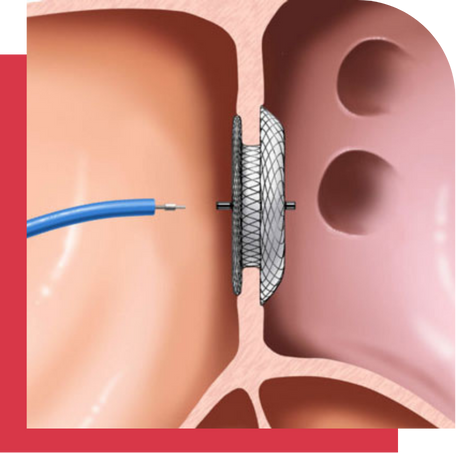Expertise
Device Closures
Device Closures. This minimally invasive procedure is used to treat congenital heart defects such as Atrial Septal Defect (ASD), Ventricular Septal Defect (VSD), and Patent Foramen Ovale (PFO) without the need for open-heart surgery.

With the expertise of Dr. C.S. Aravind, we ensure a safe and effective closure procedure that helps patients avoid major surgical risks and experience faster recovery.
What Are Device Closures?
Device Closures are minimally invasive procedures used to repair openings in the heart, such as ASD, VSD, and PFO, which are congenital defects. These openings, or holes, in the heart can cause abnormal blood flow, leading to complications like heart failure, stroke, or arrhythmias if left untreated. Device closure procedures use a special implant, often called an occluder, which is guided into place via a catheter, closing the hole and restoring normal blood flow.
Conditions Treated by Device Closures
- Atrial Septal Defect (ASD): A hole in the wall between the heart's upper chambers (atria).
- Ventricular Septal Defect (VSD): A hole in the wall separating the heart's lower chambers (ventricles).
- Patent Foramen Ovale (PFO): A small opening in the heart that didn't close properly after birth.
Device closures are particularly beneficial for patients with these congenital defects, allowing them to avoid the risks associated with open-heart surgery.
How Do Device Closures Work?
During the procedure, a thin, flexible catheter is inserted into a blood vessel, usually in the groin, and guided to the heart. The occluder, a small mesh-like device, is placed over the defect to seal the hole. The device stays in place permanently, allowing tissue to grow around it, fully closing the defect over time.
The procedure is performed under local anesthesia with sedation, and patients generally return home the next day. This minimally invasive approach results in less pain, a shorter hospital stay, and a quicker recovery compared to traditional surgery.
Benefits of Device Closures
- Minimally Invasive: Performed through a catheter with no need for open-heart surgery.
- Quick Recovery: Most patients can return to their regular activities within a few days.
- Effective Treatment: Provides long-term results, permanently closing the heart defect.
- Reduced Risk: Lower risk of complications compared to surgical procedures.
Why Choose ARAVIND HEART CARE for Device Closures?
Dr. C.S. Aravind is an experienced Consultant Interventional Cardiologist specializing in device closure procedures. At ARAVIND HEART CARE, we use the latest techniques and advanced devices to ensure a safe and successful outcome. Our team provides personalized care, ensuring that every patient receives the best treatment plan tailored to their specific heart condition.
FAQs
Most patients can return home the next day and resume normal activities within 1-2 weeks. Strenuous activities should be avoided for a few weeks, depending on your doctor’s advice.
The procedure typically takes 1-2 hours, depending on the complexity of the defect being treated. It is performed under local anesthesia with sedation.
Yes, device closures are permanent. Once the occluder is placed over the defect, it remains in the heart, and over time, tissue grows over the device, permanently sealing the hole.
No, the device is very small, and once it is placed and your body heals, you will not feel it or notice any difference in your daily activities.
Device closures are considered safe, but as with any medical procedure, there are some risks, including bleeding, infection, or device displacement. These risks are minimized by experienced interventional cardiologists like Dr. C.S. Aravind.
Device closures are ideal for patients with congenital heart defects like ASD, VSD, or PFO who are not candidates for or want to avoid open-heart surgery. A consultation with Dr. Aravind will determine if this procedure is right for you.
Most patients can resume light activities after a few days and normal activities within 1-2 weeks. Your doctor will provide specific guidance based on your condition.
You may be prescribed blood-thinning medication for a short period after the procedure to prevent clot formation. Dr. Aravind will provide detailed instructions based on your case.
Yes, device closures can be performed in both children and adults. They are particularly beneficial for treating congenital heart defects in pediatric patients, allowing for a quicker recovery and avoiding invasive surgery.
While rare, in some cases, the device may shift. If this occurs, additional procedures may be needed to reposition or replace the device. However, with experienced cardiologists like Dr. Aravind, the risk of this happening is very low.